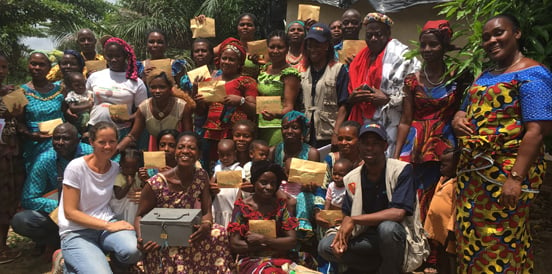Share Content
Article Link Copied
Saving as a tool for women’s empowerment

Farmers in Côte d’Ivoire often live below the poverty line and are hardly able to save money. Elizabeth is 31 years old and has 5 children. She took out a loan of 72 USD and is planning to buy cocoa seedlings to plant 1ha of cocoa farm with it. The loan was provided by the Village Savings and Loans project.
Under the roof of the Jacobs Foundation’s Transforming Education in Cocoa Communities (TRECC) program, Mondelēz International, Nestlé, Barry Callebaut, and Mars will reach out to at least 16’000 children and youth and 72’000 adults over the next three years to provide quality education, empower women and assure child labour remediation. In a newsletter series, we present first results of the different projects. In this newsletter issue we feature Mars and their Village Savings and Loans project, implemented by CARE International.
The Village Savings and Loans (VSLA) project aims to provide opportunities for women but also for men in cocoa farming households to have access to loans and learn how to save their money. It has been set-up in 14 villages, where 70 groups have been formed consisting of almost 2000 members of which three quarters are women. Over the period of one year, groups meet on a weekly basis to collect the savings of the group members and store them in a cash box. After a while, the funds in the cash box are sufficient to provide loans to the members.
100% interest rate made borrowing too expensive
After one year, the funds in the cash box (savings and interests) are shared amongst the members proportionally to their savings during a share-out meeting. 43-year-old Viviane, mother of six has taken three loans, one to cover health expenses for her daughter, one to pay for shoes to be sold on the market and one to invest in fish to be sold. She paid them all back and on top of that was able to save 211 USD. “I am very proud”, says Viviane and plans to invest her savings in the fish business, which in return will allow her to send her six children to school.
Loan institutions such as banks or microfinance institutes did not exist before and the only option to get a loan was to borrow money from someone in the community. However, the interest rate was often 100% which made borrowing extremely expensive. With the VSLA it is the group who defines the interest rate and usually sets it around 10%. Those interest rates also contribute to the “growth” of the savings, which increases the motivation for members to borrow.
Husbands appreciate wives’ contributions
The VSLA has strengthened women’s income generating activities, which often influences their position in the household in general. Husbands have become more appreciative of their wives’ contributions and include them in planning and decision-making processes. “Men and women are now working together and talking more, and there is less conflict in the households”, says 38-year-old Marie Paule. She has five children and says: “We had money before, but we were never able to keep it for more than two to three days”. Now she has learned how to save and how to spend wisely. For her it is important to send her children to school, because they are the future of the community and will care for her when she’s old.
One pillar of a comprehensive strategy
It’s the same dream that everyone pursues: Women (and men) will do anything they can to improve the livelihoods of their families and children. Côte d’Ivoire’s smallholder cocoa farmers often subsist on less than USD 0.5/day, which is considerably below the poverty line of USD 2/day. This high level of poverty is compounded by very low literacy and school attendance rates nationwide, gender inequality and child labour, particularly in rural areas.
The Jacobs Foundation has committed CHF 50 million to change this situation by implementing a comprehensive strategy to transform education, empower women, and ensure child protection in cocoa-growing communities in Ivory Coast. This initiative is called TRECC (Transforming education in cocoa communities). The collaboration with cocoa- and chocolate companies is one pillar of the overall TRECC strategy and has pioneering character for the entire industry and beyond.